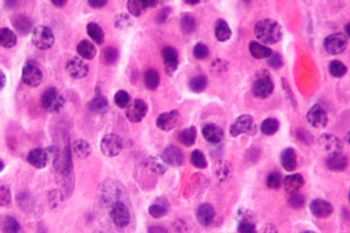
Patients with advanced clear cell renal cell carcinoma who received salvage treatment with nivolumab plus ipilimumab after progressing on nivolumab alone had significant treatment-free survival rates.
Caroline Seymour joined MJH Life Sciences in 2018 and has expertise in video production and print/digital publication. Email: cseymour@onclive.com

Patients with advanced clear cell renal cell carcinoma who received salvage treatment with nivolumab plus ipilimumab after progressing on nivolumab alone had significant treatment-free survival rates.

The FDA granted fast track designation to CTX-009 plus paclitaxel for pretreated metastatic or locally advanced biliary tract cancer.

Trastuzumab-strf was approved for HER2-overexpressing breast cancer and HER2-overexpressing metastatic gastric or GEJ adenocarcinoma.

Fast track designation has been granted by the FDA to PT217 for extensive stage small cell lung cancer with disease progression.

The FDA’s Oncologic Drugs Advisory Committee voted in favor of minimal residual disease as an end point to support accelerated approval of multiple myeloma treatments.

Patients with metastatic microsatellite stable colorectal cancer treated with a personalized neoantigen cancer vaccine after chemotherapy demonstrated an early trend towards a progression-free survival benefit.

Compared with docetaxel, adagrasib improved progression-free survival and objective response rate in patients with pretreated KRAS G12C–mutant non–small cell lung cancer.

Patients with EGFR exon 20 insertion–mutated NSCLC treated with amivantamab plus chemotherapy experienced an extension in the time to treatment discontinuation and subsequent therapy.

Patients with platinum-resistant or -refractory epithelial ovarian cancer treated with olaparib plus cediranib did not experience improvements in PFS and OS compared with chemotherapy.

The benefits of imetelstat outweigh the risks for anemia treatment in lower-risk myelodysplastic syndrome, according to a vote by the FDA’s Oncologic Drugs Advisory Committee.

Patients with unresectable or metastatic melanoma treated with the universal cancer vaccine UV1 plus nivolumab and ipilimumab did not experience an improvement in progression-free survival vs nivolumab plus ipilimumab alone.

Patients with phlebotomy-dependent polycythemia vera, a type of myeloproliferative neoplasm, treated with rusfertide experienced greater responses compared with those treated with placebo.

Patients with metastatic urothelial cancer treated with frontline maintenance therapy with avelumab following platinum-based chemotherapy in the real-world setting had similar outcomes as observed in the JAVELIN Bladder 100 trial.

The label expansion for ibrutinib with an oral suspension formulation has been approved by the FDA in all current indications including Waldenström macroglobulinemia, chronic lymphocytic leukemia/small lymphocytic lymphoma, and chronic graft-versus-host disease.

The FDA is currently reviewing a BLA that seeks the approval of datopotamab deruxtecan as a therapeutic option for pretreated nonsquamous non–small cell lung cancer.

Patients with castration-sensitive prostate cancer treated with apalutamide plus androgen deprivation therapy experienced improvements in prostate-specific antigen progression-free survival.

Patients with relapsed/refractory multiple myeloma treated with belantamab mafodotin plus bortezomib and dexamethasone experienced a significant improvement in PFS compared with daratumumab plus bortezomib and dexamethasone.

FDA granted a fast-track designation to the TROP2-directed ADC BNT325/DB-1305 for the treatment of platinum-resistant ovarian epithelial, fallopian tube, or primary peritoneal cancer.

All patients enrolled in the EV-302 trial with previously untreated, locally advanced, or metastatic urothelial carcinoma obtained a survival benefit with enfortumab vedotin-ejfv plus pembrolizumab.

Patients with non-muscle invasive bladder cancer treated with the novel photodynamic therapy TLD-1433 experienced 6-, 12-, and 15-month complete response rates of 54%, 38%, and 37%, respectively.

Treatment with durvalumab, bevacizumab, and TACE improved PFS in embolization-eligible patients with unresectable hepatocellular carcinoma.

RC88, a mesothelin-targeting antibody-drug conjugate, was granted a fast track designation from the FDA for the treatment of platinum-resistant recurrent epithelial ovarian, fallopian tube, and primary peritoneal cancer.

Three patients with resectable hepatocellular carcinoma experienced significant tumor necrosis greater than 70% after neoadjuvant treatment with low-dose stereotactic body radiation therapy and cemiplimab-rwlc, in addition to adjuvant cemiplimab.

The FDA has granted approval to enfortumab vedotin plus pembrolizumab for patients with locally advanced or metastatic urothelial cancer.

The 4-year progression-free survival rate with daratumumab, bortezomib, lenalidomide, and dexamethasone was 84.3% vs 67.7% with just bortezomib, lenalidomide, and dexamethasone.

The FDA has granted enfortumab vedotin plus pembrolizumab priority review status for patients with locally advanced or metastatic urothelial cancer following data from the phase 3 EV-302/KEYNOTE-A39 trial.

The FDA has restricted the indication for gastric cancer to only include patients whose tumors express PD-L1 (CPS ≥ 1) as determined by an FDA-approved test.

The median progression-free survival was 23.7 months with the combination vs 16.6 months with osimertinib alone.

The 12-month overall survival rates were 48.7% and 35.3% with tisotumab vedotin and chemotherapy, respectively, among patients with recurrent or metastatic cervical cancer.

Amivantamab plus chemotherapy nearly doubled the progression-free survival in patients with EGFR Exon 20-mutated non–small-cell lung cancer.